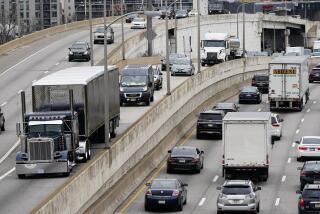Insurers Doubt Value of Anti-Lock Brakes : Safety: Some firms are ending their discounts for cars equipped with the devices. Experts cite improper use by a number of drivers.
- Share via
Auto insurers are starting to eliminate discounts for cars equipped with anti-lock brakes after concluding the devices don’t significantly reduce accident claims.
USAA, the nation’s fifth-largest auto insurer, has notified 2.5 million customers that it is ending the discounts because, it said, there is virtually no difference in the claims experience between vehicles equipped with anti-lock brakes and those with standard brakes. Allstate Corp., the second-largest auto insurer, is considering ending its discounts.
Auto-safety experts say anti-lock brakes haven’t lived up to their billing because human nature has defeated technology. But the experts disagree whether it is the fault of the engineers who designed the systems or of the drivers who use them improperly.
Conventional brakes, when pressed and held, lock the wheels, which can make a vehicle spin or skid out of control. Even without a skid, steering becomes difficult or impossible.
Anti-lock braking systems use a computer chip that directs sensors to apply pressure with a pumping action to slow the wheels without locking them. Drivers also can steer around obstacles while braking.
But the computer-directed pumping causes a vibration that usually can be felt as a pulsing in the brake pedal. Some drivers, believing their brakes are failing, react by pumping the pedal, which increases the stopping distance. Other drivers, who were taught to pump brakes to avoid a skid, continue to pump anti-lock brakes, although they shouldn’t.
And some people drive faster and take more risks because they believe anti-lock brakes will stop them sooner, insurers say.
The result, insurers say, is that the anti-lock brakes aren’t reducing accident claims.
*
USAA’s 5% to 10% discounts will be available only in three states--New York, New Jersey and Florida--that require them.
State Farm Mutual Automobile Insurance, which has been America’s largest auto insurer for 50 years, has offered discounts for anti-lock brakes only in the three states where required.
“There is no evidence that anti-lock brakes reduce claims payments. Therefore, we see no reason to voluntarily offer discounts for the device,” said State Farm spokesman Dave Hurst.
The move to drop the discounts has angered some officials in the auto industry, which adopted the anti-lock technology at the prodding of insurers.
“It seems rather unusual that the same companies who were urging the manufacturers to install anti-lock braking systems are now removing the discounts from cars and trucks that have those systems,” said William H. Noack, General Motors Corp.’s regional director of communications.
Some executives of manufacturers of anti-lock braking systems say privately that the insurance companies are trying to cut costs at the expense of policyholders.
But publicly, these companies say the problem with anti-lock brakes is that too many drivers don’t know how to use them. Brake suppliers have formed the ABS Education Alliance in Washington to educate drivers.
Officials of the National Highway Traffic Safety Administration said the highway results from the use of anti-lock braking systems are so mixed that the agency is postponing a decision on whether to require them on new passenger cars and trucks.






